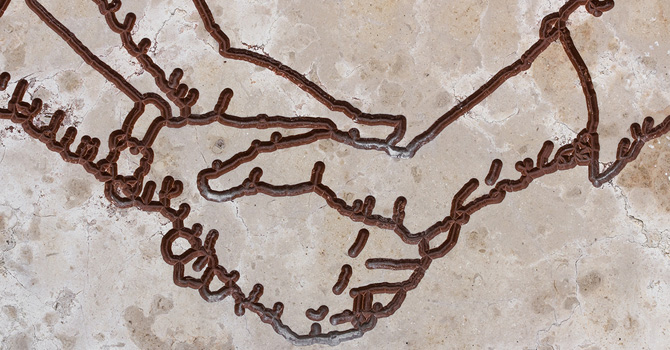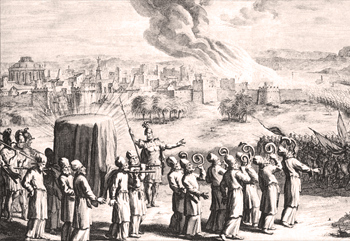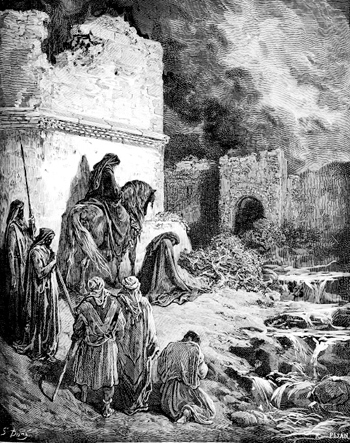Editor’s note: Faith & Leadership offers sermons that shed light on issues of Christian leadership. This sermon was preached at the Duke Divinity School baccalaureate on May 9, 2009.
There’s a story about a famous preacher who was a bit of a fraud, because the sermons were great but no one ever realized that in fact they’d all been written by the staff assistant. Finally the assistant’s patience ran out, and one day the preacher was speaking to thousands of expectant listeners and at the bottom of page two read the stirring words, “And this, my friends, takes us to the very heart of the book of Habakkuk, which is…” only to turn to page three and see nothing but the dreaded words, “You’re on your own now.”
Here we are in a great celebration of the life of the church and our beloved divinity school, thronging our graduates with congratulation and benediction; but at the back of every single graduate’s mind right now is the lurking fear that what today really means is, “You’re on your own now.”
“You’re on your own now.” Just what Elisha felt the day Elijah departed to heaven. Just what the disciples felt at Jesus’ ascension. “You’re on your own now.” In England they say, “That makes me feel somewhat uncomfortable.” In North Carolina we say, “Yikes.” I’m going to read the story of Elijah’s departure into heaven three times this evening, once as a very human story in the lives of Elisha and the company of the prophets, once as a theological story in the hands of the early Church, and a third time as a word from God to those graduating from Duke Divinity School this weekend.
So let’s begin with the very human story. I wonder whether you’ve ever found it difficult to let go. I wonder if you’ve ever said, or thought, or sung, “I can’t live, if living is without you.” I wonder if you recall a goodbye where one person, or maybe both, have held the hug a bit longer than you’re supposed to, long enough to say, “This isn’t just a hug” -- making it clear they had no real strength to let go. There was really nothing to say, and maybe tears, maybe platitudes, maybe silence didn’t so much fill the need for an epitaph as amplify the hug. Maybe that’s how you feel right now.
It’s a tough call whether it’s harder to be the one leaving, or harder to be the one left behind. The one leaving is heading into the unknown; the one left behind is returning to the known, but without the person who makes the known make sense. Maybe it’s a goodbye of a parent to a child. Maybe it’s a goodbye of two lovers, or two friends. Or maybe, as in this case, it’s the departure of a man who drew back the veil between heaven and earth. Elijah had opened heaven to earth, and that’s why he was known as a prophet -- one of the greatest; one of the best. And now Elisha is facing the question, “Where is the Lord, the God of Elijah?”
And so three times, three times in six verses, Elisha says to Elijah, “I will not leave you.” Elisha maybe still isn’t quite clear exactly who Elijah really is and what his presence among the Israelites truly means, but he knows that Elijah has the words of eternal life and so he’s sure he’s going to stick like a limpet wherever Elijah goes. And then we get this little detail. “Fifty of the company of prophets also went, and stood at a distance.” It seems that whenever it’s time to say one of those big goodbyes, there’s someone else watching. You’re in a parking lot, and cars driving past linger for a bit of human interest. You’re in a hospital ward, and the next-door bed is breaking world records for the number of visitors. You’re in an airport, and the person checking the boarding passes has no eye for passion or tragedy, only for whether you have more than two carry-on items and your toothpaste in a small transparent bag. Well, Divinity class of 2009, the company of the prophets has sure showed up today. And there’s a whole lot more than 50 of them -- look around and see.
Now the company of the prophets in the story have done CPE. They know how to be really, genuinely, exquisitely insensitive. They keep rubbing it in to Elisha that this is the day to say goodbye to Elijah -- and Elisha each time says, “I know: shut up.” It’s one thing to say a difficult goodbye, it’s another to be in the glare of public attention and be asked every few moments, “How do you feel?” Well, we get a good sense of how Elisha feels. His master disappears in a whirlwind, and he tears his clothes in two pieces. If you don’t have many clothes, that’s a big deal. Read “tosses away the photo albums”, “burns the mattress,” or “smashes up the computer” -- whatever is your gesture of finality and despair, that’s where Elisha is. “The big man… The big man… is gone.” You can see the tears. They don’t need to be in the story.
Our literature, song and movies are full of poignant like this, though they don’t usually involve chariots of fire. But this is two grown-up men who don’t have access to the conventional vocabulary of farewell. I wonder whether in the last few days you got a chance to say goodbye to your teacher, your mentor, the one faculty person who became more than just a professor, the pastor who really did draw back the veil between heaven and earth for you. There isn’t a large vocabulary for such goodbyes. And Elisha isn’t just facing the loss of Elijah. He’s facing the inheritance. These are big shoes to fill. This is a tough act to follow. Elisha needs a first son’s share of the inheritance, and he asks for it. And so we get that last element of a human parting: the fumbling around for a suitable token of remembrance. Will a tangible gift do it? The tasteful paperweight? Or is that inadequate, and must it be something intangible? The loyal honor gift to the Divinity School’s Annual Fund? Elijah offers both. A double share of his spirit. And his mantle, physically and metaphorically. Just as well, as it happened, because Elisha has just torn up his own mantle in his distress, and he’ll be needing a new one. So that’s the human story.
Now look at this story through the eyes of the early church, after they’d recently said goodbye to Jesus. Jesus had spent a good deal of time with them teaching and healing, the way Elijah had. The farewell discourses in John’s gospel give a pretty thorough account of how painful it was to say goodbye. Like Elijah, Jesus promises there will be a double portion of his spirit to come on his disciples after he’s gone, and at Pentecost, as at Elijah’s departure, there’s a lot of wind involved. Heard through gospel ears, Elisha’s injunctions to the company of the prophets to be silent sound rather like Jesus’ commands to his disciples and to those he had healed to say nothing to anybody. Elisha’s insistence by the highest authority he can name that he will never leave Elijah sounds very much like Peter’s insistence at the Last Supper that even if all the other disciples fall away, he, Peter, will never fall away. Even the company of prophets watching from a distance reminds us of the women watching from a distance at Jesus’ crucifixion.
And then there’s the account of Elijah parting the waters of the Jordan, which is itself reminiscent of first Moses and then Joshua parting the waters. But in Elijah we get for the first time a sense that the waters of the Jordan are like the waters of his own death. His legacy to Elisha is that he, Elisha, too can part the waters of death by picking up Elijah’s mantle. And it’s easy to see here that this story helped the early Christians perceive Jesus’ death and resurrection as standing in this same tradition. Jesus took on his Father’s mantle. Jesus too crossed over the Jordan of death to the glory of new life. And for the early disciples the implication of this story must have been clear. It was not for them to mourn Jesus and rend their garments: it was for them to take up the mantle and do what he had done, parting the waters of death and living in the power of the double portion of his spirit. As Jesus says in John 14, “Anyone who believes in me will do what I have been doing.”
And that brings us to today, to you, to those graduating from Duke Divinity School this weekend. And to those words that put a shiver down your spine, “You’re on your own now.” It’s time to say goodbye to Elijah. And what do I mean by Elijah? Well, most obviously, those who have taught you and trained you and helped you on your way. Some of the Divinity faculty look more like Elijah than others, and one or two of your teachers you might have fancied sending up into the sky with a one-way ticket on a chariot of fire. But I moved 4,000 miles to join this faculty because I believed it was the best divinity faculty there is, period. And I haven’t changed my mind. So of course it’s a hard environment to leave. Of course you’ll always wonder what Professor So-and-So would have said about this text and what Dr. What’s-Her-Name would have made of this pastoral crisis and even whether Dean Someone-Or-Other would have hired this ex-offender. You’ve had access to a great deal of learning and now its time for that learning to turn into wisdom. But it’s not just the faculty and staff. For most people there’s been a church community, either prior to coming to seminary, or discovered once here, that will be for you the template for all other church communities. You’ll be the bore that says, silently or aloud, “It was never like that at Epworth” or “This is how we always did it at St Bruno’s.” But for most of you, you’ve got to say goodbye to them today as well. Epworth and St Bruno’s are also Elijah and it’s time to inherit their mantle. And some of those hugs may be long and silent, too. And there will always be other Elijahs around. I’m sure there’s more than one person here who’s privately thinking, “I wonder if today my dad will finally be proud of me.” Well I’ve got news for you and I’ve got news for your dad: It’s time to inherit the mantle.
And what does it mean for you to take up the mantle? Well, we need to acknowledge that the churches you will be joining as clergy or lay people are experiencing their own grief and lament. Many of them feel they too have lost Elijah and are experiencing the chill wind of being alone. There was a time of old certainties, when the pastor really was somebody, theological vocabulary really did have a place in daily conversation, family, church and nation really did seem to have a consistent thread running through them, marriages really did seem to stick together, teenagers really did have an economically driven sense of purpose that kept them to recognizable standards and goals. This was Elijah’s time. A lot of us can’t remember it but boy do we hear about it all the time. And then, it seems, there was a whirlwind. The whirlwind is sometimes called the sixties. But the whirlwind seems in retrospect to have been mighty fine. Churches still really mattered, and their leaders quite frequently marched at the head of the social movements of the time. The political language of the period, in the mouths of men like Dr King, was drenched in theological rhetoric, and there really was a sense that people were coming out of the wilderness and may indeed reach the promised land sometime soon. They were great days, when the story really seemed to be about us. A lot of us can’t remember it but boy do we hear about it all the time. The grief and lament for those whirlwind times is real.
But we’re with Elisha. We’re on the other side of the Jordan. We can’t go back to Elijah’s time, and we can’t spend our lives in the whirlwind. And that’s why there’s a lot of tearing of garments in grief in the church right now. So what does it mean to pick up the mantle today, to walk from the Jordan leaving Elijah and the whirlwind behind? It means enjoying what’s possible now that wasn’t so possible before. For example, the word Christian used to be an adjective -- in Elijah’s time it meant “American” and during the whirlwind it meant “person of good will.” Now in Elisha’s time it can go back to what it was for the early church -- a noun. A Christian is a socially deviant politically unreliable worshiper of a God beyond the imagination of the advertisers and social critics. We need to be very careful about using the word Christian as anything other than a noun.
To pick up the mantle today means to continue to build institutions, but to do so without the pretensions of social control. Our job is not to run America; it’s to model a society that would be impossible without the death and resurrection of Jesus and to provoke people’s curiosity into how such a thing is possible. We need institutions to train people to live in and guide and inspire such communities. We need people to lead those institutions. And those people are sitting right in front of me right now. Hello down there. I’m talking about you.
And finally we need to hear Elisha calling “Father, father!” We need to hear his pain but we also need to hear the unique opportunity we now have. Elisha is saying he’s a child, a child who has lost his teacher, his mentor, his father. In Elijah’s day the churches tried to parent the whole nation, and did a pretty good job at it. During the whirlwind the churches became teenagers, angry adolescents demanding their parents set the house straight and make sure everyone got fair shares. Now, perhaps for a fleeting moment, in Elisha’s time, we get the chance to be children. We get to use our imaginations. We get to play. We get to laugh, to trust, to love instinctively and to see life as an adventure. Wouldn’t it be wonderful for a moment to see church not as parent, not as adolescent, but as child; not seeing decline in numbers, faith and social influence, not blinded by injustice, rights and campaigns, but seeing the wonder of God’s miracles, the glory of God’s goodness, the joy of God’s humor?
For a moment, here in Elisha’s time, on this side of Jordan, with Elijah gone and the whirlwind over, let’s live with the early church in the delirious joy of the discipleship adventure, the wonder of God’s grace, good as new. For a moment let’s like a child dance in the meadow of God’s glory and drink in the nectar of God’s Spirit. For a moment let’s rest in the palm of the everlasting hands and play in the pool of the ever-renewing waters. And let that moment be now.













